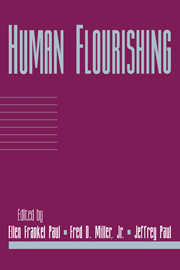Book contents
- Frontmatter
- Contents
- Introduction
- Acknowledgments
- Contributors
- Human Flourishing and the Appeal to Human Nature
- The Three Faces of Flourishing
- Flourishing Egoism
- The Idea of a Life Plan
- Human Flourishing Versus Desire Satisfaction
- Happiness and Human Flourishing in Kant's Ethics
- Valuing Activity
- Ancient Perfectionism and Its Modern Critics
- Aristotle's Elusive Summum Bonum
- Eudaimonism, Love and Friendship, and Political Community
- No Families, No Freedom: Human Flourishing in a Free Society
- Politics, Neutrality, and the Good
- Human Flourishing and Universal Justice
- Index
Valuing Activity
Published online by Cambridge University Press: 05 October 2013
- Frontmatter
- Contents
- Introduction
- Acknowledgments
- Contributors
- Human Flourishing and the Appeal to Human Nature
- The Three Faces of Flourishing
- Flourishing Egoism
- The Idea of a Life Plan
- Human Flourishing Versus Desire Satisfaction
- Happiness and Human Flourishing in Kant's Ethics
- Valuing Activity
- Ancient Perfectionism and Its Modern Critics
- Aristotle's Elusive Summum Bonum
- Eudaimonism, Love and Friendship, and Political Community
- No Families, No Freedom: Human Flourishing in a Free Society
- Politics, Neutrality, and the Good
- Human Flourishing and Universal Justice
- Index
Summary
INTRODUCTION
Call the proposition that the good life consists of excellent (or virtuous), distinctively human activity the Aristotelian Thesis. I think of a photograph I clipped from the New York Times as vividly depicting this claim. It shows a pianist, David Golub, accompanying two vocalists, Victoria Livengood and Erie Mills, at a tribute for Marilyn Home. All three artists are in fine form, exercising themselves at the height of their powers. The reason I saved the photo, however, is Mr. Golub's face. He is positively grinning, as if saying to himself, “And they pay me to do this?”
Mr. Golub's delight is a sign of his activity's value, not what makes it good. His pleasure “completes the activity … as an end which supervenes as the bloom of youth does on those in the flower of their age” (1174b33-35). The metaphor is apt, since “eudaimonia,” Aristotle's term for the human good, is frequently translated as “flourishing.” “Flourish” comes from the same Old French root as “flower” (“ florir ”). When applied to plants and trees, “flourish” meant to grow vigorously to the point of putting out leaves or flowers. And a “flourish” was originally the bios som itself. More generally, something flourishes when it thrives or prospers as a healthy plant does coming to full flower. Making the relevant substitutions, Mr. Golub's manifest enjoyment is the sign of his flourishing, its flower or “flourish.” What his flourishing consists in, however, is the excellent activity that produces his delight.
- Type
- Chapter
- Information
- Human Flourishing , pp. 176 - 196Publisher: Cambridge University PressPrint publication year: 1999
- 4
- Cited by

